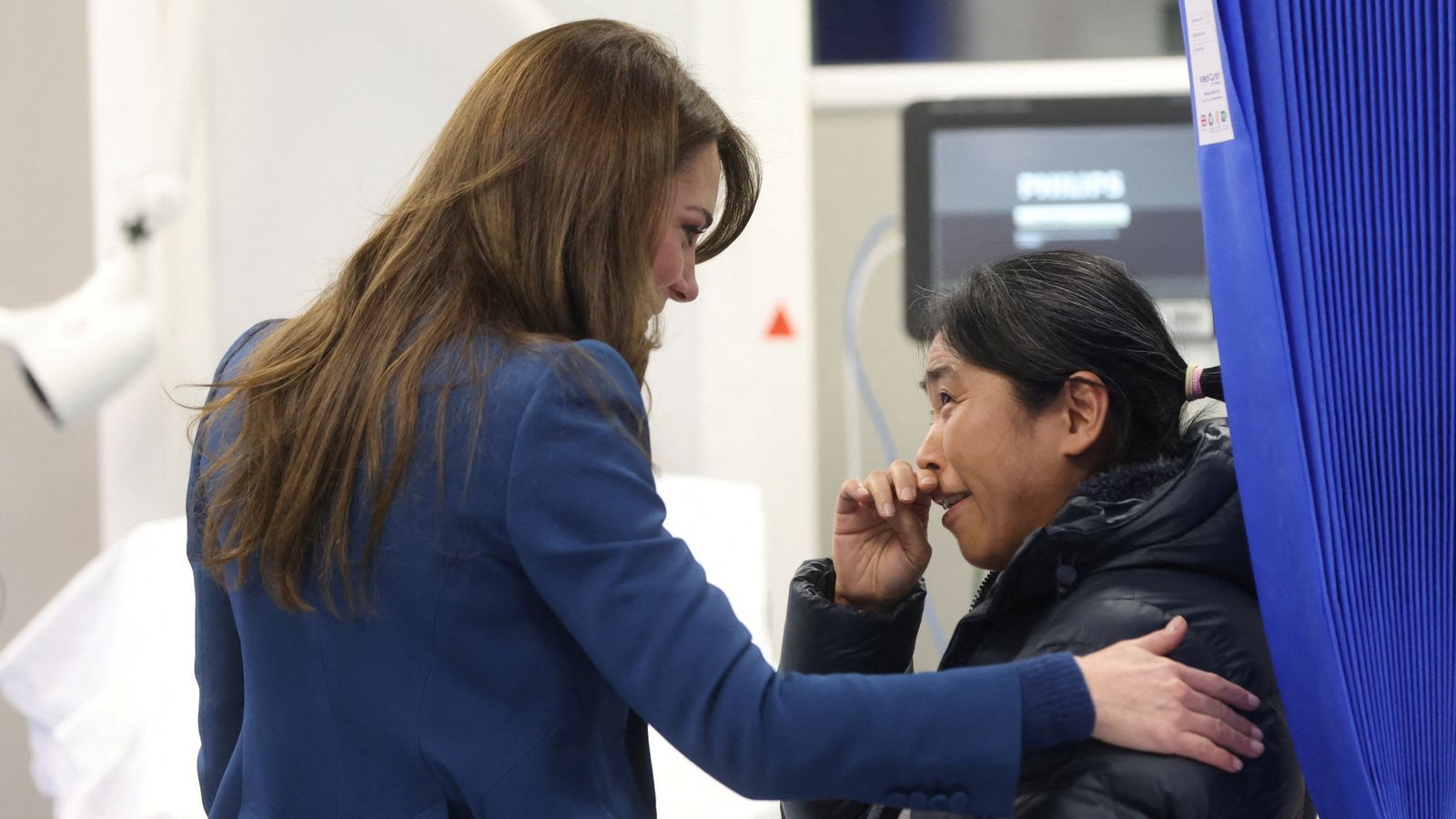As the Princess of Wales reveals cancer was found during her abdominal surgery in January, experts explain what preventative chemotherapy is, how it works and when it’s used.
What is preventative chemotherapy?
The Princess of Wales says that at the time of her surgery, it was thought her condition was non-cancerous.
But tests following the surgery revealed that cancer was present.
Also known as adjuvant therapy, preventative chemotherapy is often used after surgery to reduce the chance of cancer coming back and spreading.
Lawrence Young, professor of molecular oncology at the University of Warwick, explains: “Even after successful removal of all visible cancer by surgery, microscopic cancer cells can remain lurking in the body and can’t be detected by current tests.”
When is preventative chemotherapy used?
Leading cancer specialist and consultant oncologist Dr Karol Sikora says it can be used when “risk of recurrence is high”.
He told Sky News: “The way treatment is delivered is so much nicer now and it is really done very professionally and she will be getting the best care possible.”
He explains that doctors are able to predict the “right treatment for the right patient”.
“Although it is unpleasant, chemotherapy is of great benefit”.
Thomas Moore, Sky’s science correspondent, explains the usual procedure following many surgeries.
“They do tests on the cells and that’s when they would have discovered that it was cancerous,” he says.
“When they are talking about preventative chemotherapy, that is in case there are any other cells that were left behind after the surgery, to make sure those are not the seeds of a cancer that grows back.”
The NHS describes adjuvant chemotherapy as chemotherapy used to “reduce the risk of the cancer coming back after radiotherapy or surgery”.
Sometimes cancer can ‘escape the organ of origin’
Dr Mangesh Thorat, Honorary Reader, Queen Mary University of London and Consultant Breast Surgeon, Homerton University Hospital, says tests and scans can’t detect microscopic cancers, so preventative treatments are used when cancer is known to be present.
On discovering cancer was present following her surgery, the decision will have been taken to give the princess chemo to make sure any lingering cancerous cells are killed.
“Surgery is the most curative form of treatment for early-stage cancers of solid organs.
“However, occasionally some cancer cells escape the organ of their origin and start residing in other organs such as lung or liver.
“Tests and scans currently available are unable to detect such microscopic spread and therefore to improve chances of cure, presumptive treatment of such likely spread is often undertaken even after the cancer in the solid organ of origin is completely removed.
“Depending on the type of cancer, a range of drugs that can reach all organs of body where such spread might have occurred are used.
“Chemotherapy is one such type of treatment that uses drugs which particularly act on rapidly dividing cells, for example, cancer cells, and kills such cells.”
Does it work better on certain groups?
Andrew Beggs, MRC Senior Clinical Fellow and Consultant Colorectal Surgeon, University of Birmingham, describes preventative chemo as “a bit like mopping a floor with bleach when you’ve spilt something on it, chemotherapy kills any spilt cells”.
“Age has no effect on the success rate of chemotherapy except when the cancers are ‘immune hot’ which are commoner in young people – in this case a type of chemotherapy called immunotherapy could be given.”
He says that younger people can “tolerate higher doses of chemotherapy” better, so can be given stronger treatment plans that are “more likely to kill any leftover cells”.
He says chemotherapy “is generally given for between three to 12 months, depending on what type of cancer it is”.
Read more:
Live reaction
Analysis: This statement is right from the heart
How long does preventative chemotherapy last?
It depends on the type and stage of cancer, but the princess has not revealed these details.
Professor Lawrence says: “The sort of chemotherapy and the time length of treatment depends on the type and stage of cancer as confirmed by examining the cancer removed at surgery.”
Prof Lawrence explains that the side effects of chemotherapy “also depend on the type of drugs used but commonly include tiredness, nausea, increased risk of getting an infection and loss of appetite”.
While we don’t know what stage the princess’s cancer is, Prof Lawrence says “an incidental finding of cancer during surgery for other conditions is often associated with the tumour being detected at an early stage when subsequent chemotherapy is much more effective”.
How is preventative chemotherapy usually administered?
Pat Price, chair of Radiotherapy UK and leading cancer doctor, said the surgery itself will have removed the cancer.
“Sometimes in some tumours there’s a little bit of a concern about whether there’s anything that’s been left behind or whether there’s a risk of it coming back,” she told Sky News.
Doctors will then often use preventative chemotherapy, usually in the form of tablets or injections, she says.
Click to subscribe to the Sky News Daily wherever you get your podcasts
This will often be given for a period of either four or six months and then it is finished, at which point things would “hopefully” be ok.
She explained that chemotherapy hits all of a person’s cells – both the cancer cells and normal tissue.
This can then cause issues with bone marrow and the gut, causing symptoms such as feeling sick or low blood count.
Some people tolerate it well, she says.
The Princess of Wales said she is “well and getting stronger every day”, paying tribute to her husband as a “great source of comfort and reassurance too”.
She called for “time, space and privacy” as she completes her treatment.

